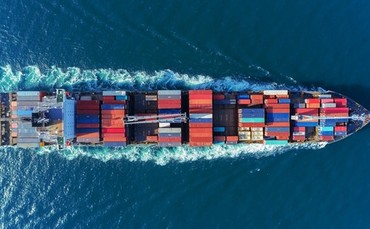Efforts to cut emissions from the the maritime industry took a step forward this week, following the completion of a successful trial of a biofuel-blended marine fuel using tankers operated by shipping giant Maersk.
Oil and gas giant BP today announced it has successfully completed a trial of its Marine B30 fuel, which is made from renewable biofuel blended with very low sulphur fuel oil, in partnership with Maersk Tankers and with support from the Danish Maritime Authority.
Tests were carried out to assess the reliability and performance of the B30 biofuel in two Maersk product tankers chartered by BP, the Maersk Cirrus and Maersk Navigator, as they sailed from Rotterdam to West Africa.
The trials demonstrated that the biofuel blend could be used as a marine ‘drop-in fuel’ – meaning that no modification was needed to the existing engine and fuelling infrastructure to switch to the fuel, which promises to slash emissions compared to conventional fuels.
Test were carried out on the ships’ main engines, auxiliary engines, boilers, and fuel tanks. No adverse effects to equipment or machinery were found during or after the trials, BP confirmed.
The fuel consists of 30 per cent fatty acid methyl esters (FAME), a renewable biofuel that is physically similar to conventional diesel and produced from recycled cooking oils and renewable oil sources.
“The need to cut emissions is one of the most important challenges facing shipping right now,” said Christian Ingerslev, CEO of Maersk Tankers. “We are only able to rise to this challenge if we do it in partnerships and explore a multitude of solutions. With bp, we are combining our expertise to play our part in testing and making alternative fuels available.”
Carol Howle, BP’s executive vice president of trading and shipping, said: “With an ambition to be a net zero company by 2050 and help the world get there too, it’s vital we help decarbonise this hard-to-abate sector. We’re proud to be working with a partner like Maersk Tankers, to develop new alternative fuels and low carbon solutions that will help accelerate the shipping industry’s energy transition.”
Biofuels remain highly controversial in some quarters, with critics maintaining that such fuels often fail to deliver promised emissions amidst warnings that developers will struggle to meet growing demand without considerable land use advocates. However, advocates of biofuel technologies insist they can be produced using waste feedstocks and can slash emissions from hard to abate sectors such as aviation and shipping.
The successful trial comes just weeks after the shipping industry again faced criticism from environmental campaigners after the IMO’s Marine Environmental Protection Committee failed to agree to a strengthening of climate goals when the a majority of countries obstructed proposals for a 2050 net zero emission target for the industry. Members said they would revisit current targets to halve emissions by 2050 in 2023, despite these targets being considered to fall badly short of the global ambition to decarbonise in line with a 1.5C warming trajectory.



















Discussion about this post